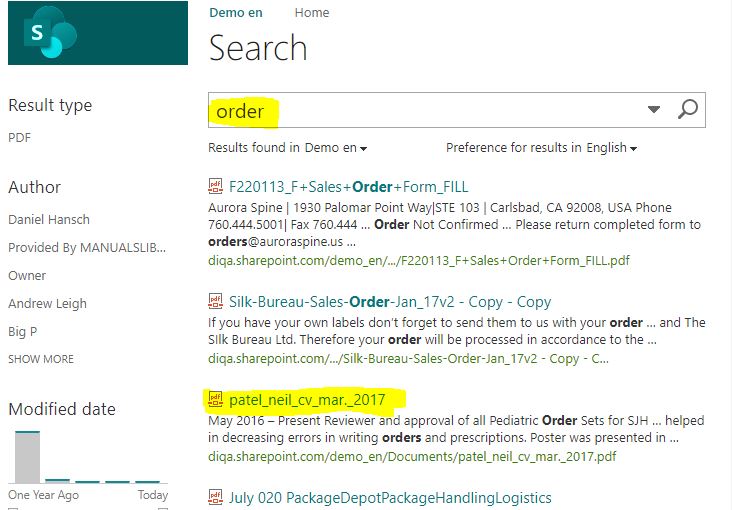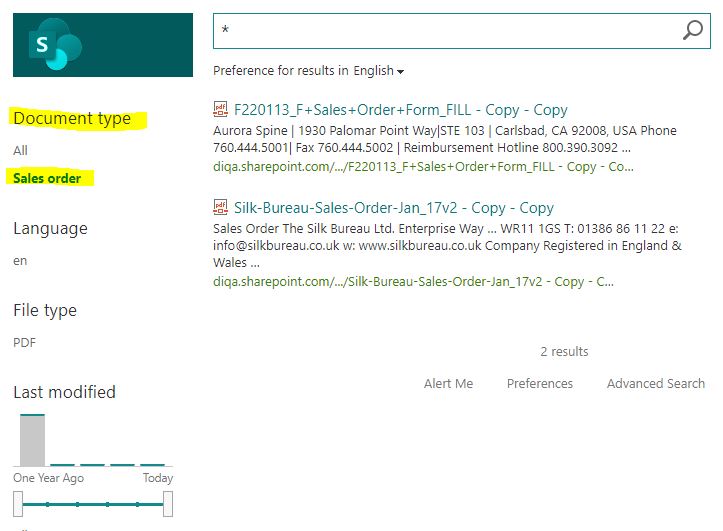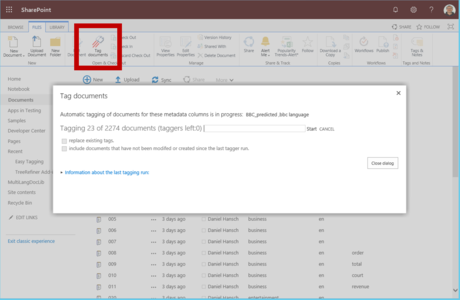Difference between revisions of "Blog/Boost document findability with tags in O365"
| Line 16: | Line 16: | ||
</p> | </p> | ||
<p> | <p> | ||
| − | You can provide your users with a better search experience if you use search refiners. Users can further refine their search result by clicking on the refiner values, e.g. to retrieve "sales orders" or "invoices", only. Before you are able to create meaningful search refiners, you have to arrange for a couple of pre-requisites which include tagging documents with tags. | + | You can provide your users with a better search experience if you use search refiners. Users can further refine their search result by clicking on the refiner values, e.g. to retrieve "sales orders" or "invoices", only. Before you are able to create meaningful search refiners, you have to arrange for a couple of pre-requisites which include tagging documents with tags. This guide shows you how to automatically tag documents with their type (e.g. invoice, sales order, cv, inquiry) and how to provide search refiners that contain these document types. |
</p> | </p> | ||
<div class="row"> | <div class="row"> | ||
| Line 49: | Line 49: | ||
<div class="row funktionen-row"> | <div class="row funktionen-row"> | ||
<!-- --><div class="col-md-6 col-md-border funktionen" style="text-align: justify; "> | <!-- --><div class="col-md-6 col-md-border funktionen" style="text-align: justify; "> | ||
| − | === | + | === Create a termset with your document types === |
Launch the automatic tagging process for all documents in a library (or a subset) in the "Tag documents"-dialog. Inspect the tagging progress and check the tagging report after the process has completed. | Launch the automatic tagging process for all documents in a library (or a subset) in the "Tag documents"-dialog. Inspect the tagging progress and check the tagging report after the process has completed. | ||
<!-- --></div> | <!-- --></div> | ||
<!-- --><div class="col-md-6 col-md-border funktionen imageExpand" style="text-align: justify; >[[File:Tag_a_library.PNG|x300px|center|middle]]</div> | <!-- --><div class="col-md-6 col-md-border funktionen imageExpand" style="text-align: justify; >[[File:Tag_a_library.PNG|x300px|center|middle]]</div> | ||
</div> | </div> | ||
| + | <div class="row funktionen-row"> | ||
| + | <!-- --><div class="col-md-6 col-md-border funktionen" style="text-align: justify; "> | ||
| + | === Create a column for your document library that contins the document types === | ||
| + | Launch the automatic tagging process for all documents in a library (or a subset) in the "Tag documents"-dialog. Inspect the tagging progress and check the tagging report after the process has completed. | ||
| + | <!-- --></div> | ||
| + | <!-- --><div class="col-md-6 col-md-border funktionen imageExpand" style="text-align: justify; >[[File:Tag_a_library.PNG|x300px|center|middle]]</div> | ||
| + | </div> | ||
| + | <!-- --><div class="col-md-6 col-md-border funktionen" style="text-align: justify; "> | ||
| + | === Manually tag a couple of documents as examples (not all!) === | ||
| + | Launch the automatic tagging process for all documents in a library (or a subset) in the "Tag documents"-dialog. Inspect the tagging progress and check the tagging report after the process has completed. | ||
| + | <!-- --></div> | ||
| + | <!-- --><div class="col-md-6 col-md-border funktionen imageExpand" style="text-align: justify; >[[File:Tag_a_library.PNG|x300px|center|middle]]</div> | ||
| + | </div> | ||
| + | <!-- --><div class="col-md-6 col-md-border funktionen" style="text-align: justify; "> | ||
| + | === Install the Easy Tagging App from the App Source (free evaluation!) === | ||
| + | Launch the automatic tagging process for all documents in a library (or a subset) in the "Tag documents"-dialog. Inspect the tagging progress and check the tagging report after the process has completed. | ||
| + | <!-- --></div> | ||
| + | <!-- --><div class="col-md-6 col-md-border funktionen imageExpand" style="text-align: justify; >[[File:Tag_a_library.PNG|x300px|center|middle]]</div> | ||
| + | </div> | ||
| + | <!-- --><div class="col-md-6 col-md-border funktionen" style="text-align: justify; "> | ||
| + | === Teach a "Learn Tags" perdictor to learn from your examples === | ||
| + | Launch the automatic tagging process for all documents in a library (or a subset) in the "Tag documents"-dialog. Inspect the tagging progress and check the tagging report after the process has completed. | ||
| + | <!-- --></div> | ||
| + | <!-- --><div class="col-md-6 col-md-border funktionen imageExpand" style="text-align: justify; >[[File:Tag_a_library.PNG|x300px|center|middle]]</div> | ||
| + | </div> | ||
| + | <!-- --><div class="col-md-6 col-md-border funktionen" style="text-align: justify; "> | ||
| + | === Create a tagger that automatically creates tags for all documents (and future documents) === | ||
| + | Launch the automatic tagging process for all documents in a library (or a subset) in the "Tag documents"-dialog. Inspect the tagging progress and check the tagging report after the process has completed. | ||
| + | <!-- --></div> | ||
| + | <!-- --><div class="col-md-6 col-md-border funktionen imageExpand" style="text-align: justify; >[[File:Tag_a_library.PNG|x300px|center|middle]]</div> | ||
| + | </div> | ||
| + | <!-- --><div class="col-md-6 col-md-border funktionen" style="text-align: justify; "> | ||
| + | === Update the search schema === | ||
| + | Launch the automatic tagging process for all documents in a library (or a subset) in the "Tag documents"-dialog. Inspect the tagging progress and check the tagging report after the process has completed. | ||
| + | <!-- --></div> | ||
| + | <!-- --><div class="col-md-6 col-md-border funktionen imageExpand" style="text-align: justify; >[[File:Tag_a_library.PNG|x300px|center|middle]]</div> | ||
| + | </div> | ||
| + | <!-- --><div class="col-md-6 col-md-border funktionen" style="text-align: justify; "> | ||
| + | === Create an Enterprise Search Center === | ||
| + | Launch the automatic tagging process for all documents in a library (or a subset) in the "Tag documents"-dialog. Inspect the tagging progress and check the tagging report after the process has completed. | ||
| + | <!-- --></div> | ||
| + | <!-- --><div class="col-md-6 col-md-border funktionen imageExpand" style="text-align: justify; >[[File:Tag_a_library.PNG|x300px|center|middle]]</div> | ||
| + | </div> | ||
| + | <!-- --><div class="col-md-6 col-md-border funktionen" style="text-align: justify; "> | ||
| + | === Add the new refiner to the search page === | ||
| + | Launch the automatic tagging process for all documents in a library (or a subset) in the "Tag documents"-dialog. Inspect the tagging progress and check the tagging report after the process has completed. | ||
| + | <!-- --></div> | ||
| + | <!-- --><div class="col-md-6 col-md-border funktionen imageExpand" style="text-align: justify; >[[File:Tag_a_library.PNG|x300px|center|middle]]</div> | ||
| + | </div> | ||
| + | <!-- --><div class="col-md-6 col-md-border funktionen" style="text-align: justify; "> | ||
| + | === Verify the refiner values === | ||
| + | Launch the automatic tagging process for all documents in a library (or a subset) in the "Tag documents"-dialog. Inspect the tagging progress and check the tagging report after the process has completed. | ||
| + | <!-- --></div> | ||
| + | <!-- --><div class="col-md-6 col-md-border funktionen imageExpand" style="text-align: justify; >[[File:Tag_a_library.PNG|x300px|center|middle]]</div> | ||
| + | </div> | ||
| + | |||
| + | |||
</p> | </p> | ||
</div> | </div> | ||
Revision as of 16:58, 28 September 2020
O365: Boost document findability with tags (September 1, 2020)
Finding documents in Sharepoint online/Office 365 can be tedious. If you want to restrict your search to certain document types (like: reports, inquiries, CVs, sales orders, invoices) you either end up with too many irrelevant search hits or relevant documents don't show up because they don't include the search term. If you rely on Sharepoint's fulltext search capabilities only, then your users will be frustrated and spend too much time to find the right documents.
You can provide your users with a better search experience if you use search refiners. Users can further refine their search result by clicking on the refiner values, e.g. to retrieve "sales orders" or "invoices", only. Before you are able to create meaningful search refiners, you have to arrange for a couple of pre-requisites which include tagging documents with tags. This guide shows you how to automatically tag documents with their type (e.g. invoice, sales order, cv, inquiry) and how to provide search refiners that contain these document types.
Frustrating search experience without meaningful refiners:
Entering the search term "order" returns a lot of irrelevant documents (e.g. a CV) and even misses some sales order documents.


